“Drive it ‘til the wheels fall off” isn’t the safest decision. So when does it end?

I recently settled into my easy chair and found this little tidbit in a recent copy of Car and Driver that made me want to shoot right on over to the dealer to see if this part was in-stock:
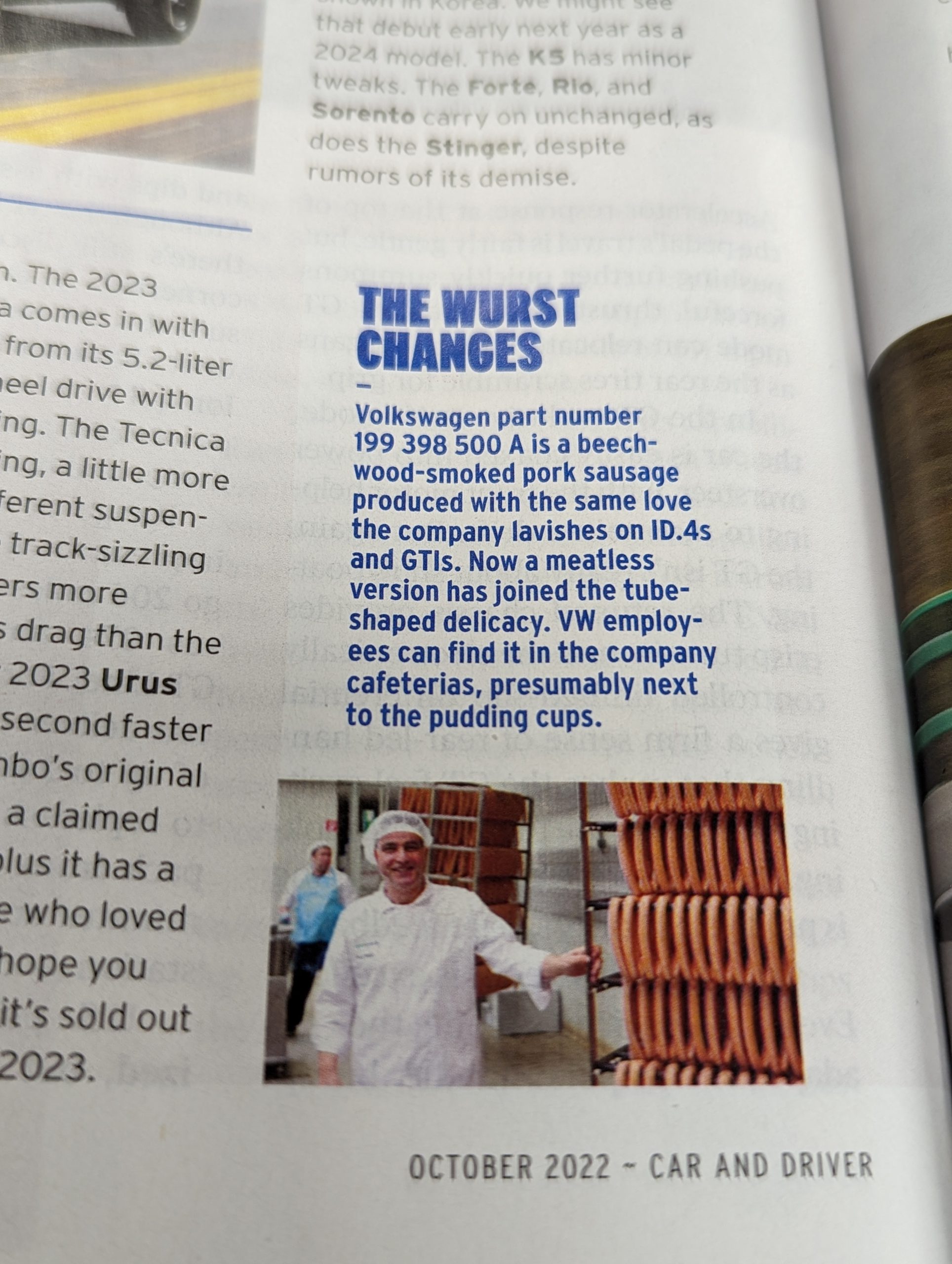
Between Quiroga, Dyer, and now VW sausage over there at C&D, I really like that mag. Photo by Lemmy.
I immediately asked a friend who is knowledgeable about all things German if these were any good, and he said, “Jawohl natürlich!” (“Yes sir!”) and then informed me that currywurst is just an old-fashioned frankfurter. I was confused about the curry, and he told me that’s actually a component of the condiment: evidently, ze Germans add curry to the ketchup for a spicy kick.
So, being a good investigative automotive reporter, I dug in on this. At first, I learned superficial things: No, sadly, 199 398 500 A cannot be ordered. (Nor can 199 398 500 B, the obvious pairing: the curry-laced ketchup.) It’s never been available in America. It just was not happening; I couldn’t find a place to order it.
“The best chance to taste Volkswagen’s hand-crafted cuisine for yourself will likely involve a trip overseas. Fresh currywurst can’t be imported here; for those rare occasions when Volkswagen has wanted to serve currywurst in the United States, it has flown the butchers into the country and replicated the production line with local ingredients,” Volkswagen reported on its press site in 2018.
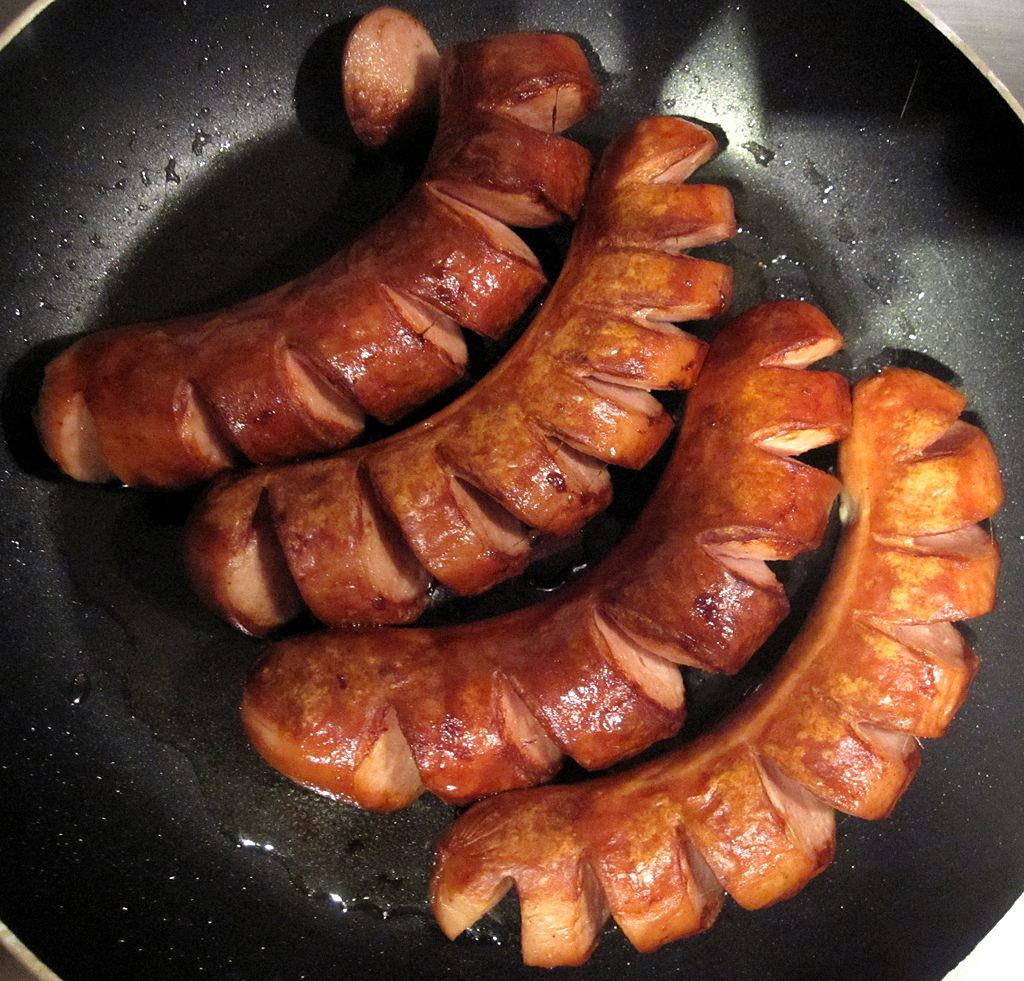
Volkswagen currywurst., which is sadly very unavailable. Photo by Monstourz.
Before discussing my foray into delicious German cuisine, let’s ask and answer the obvious question here: why in the hell was Volkswagen making sausage?
Volkswagen has been feeding workers on site at the plant in Wolfsburg, Germany, since 1938. In fact, VW owned farms and whole animals were delivered to the factory to feed the people building the cars. This is all the info I could get about this in all the puff pieces I read about the currywurst over the years. The Wikipedia page glosses over the origin a bit, referencing an article attributing this arrangement to Wolfsburg’s remote location.
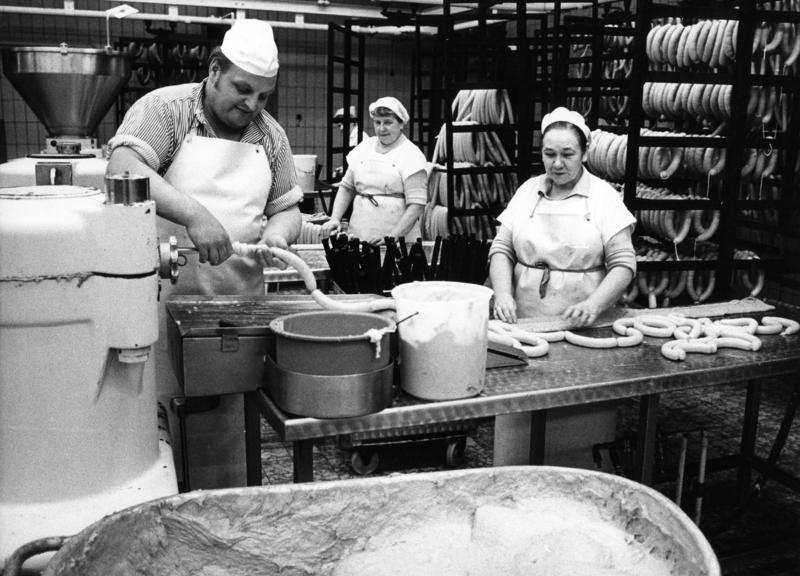
The Volkswagen butchery in 1973. Photo by Lothar Schaack.
As it turns out Wolfsburg isn’t all that rural. I kept searching, having a sneaking suspicion that this practice occurring in Germany in 1938 was going to be heartbreaking, and it was. At least as early as 1940 it’s documented that a significant portion of workers were forced laborers, prisoners of war, and concentration camp prisoners. Feeding them was the only way to keep them alive and working. This is an uncomfortable reality, but Volkswagen documents this well, no doubt in an effort to atone for an imperfect past.
Interestingly, those farms weren’t making pork for currywurst because it didn’t exist yet. Currywurst is said to have been “invented” in 1949 out of a pure lack of ingredients in a country recently rocked by war. A street food vendor got her hands on curry powder and ketchup from British soldiers, and it sold well.
Forced labor ended in Wolfsburg at the end of World War II, and through the ‘50s and ‘60s, the factory transitioned to normal business using hired labor. Volkswagen canteens first made currywurst for its workers in 1973. It was popular with employees, and that’s when it got its own part number. At some point along the way, Volkswagen got out of the farming business, but they did keep cranking out sausages, which were available in two sizes: one about five inches long and one about 10.
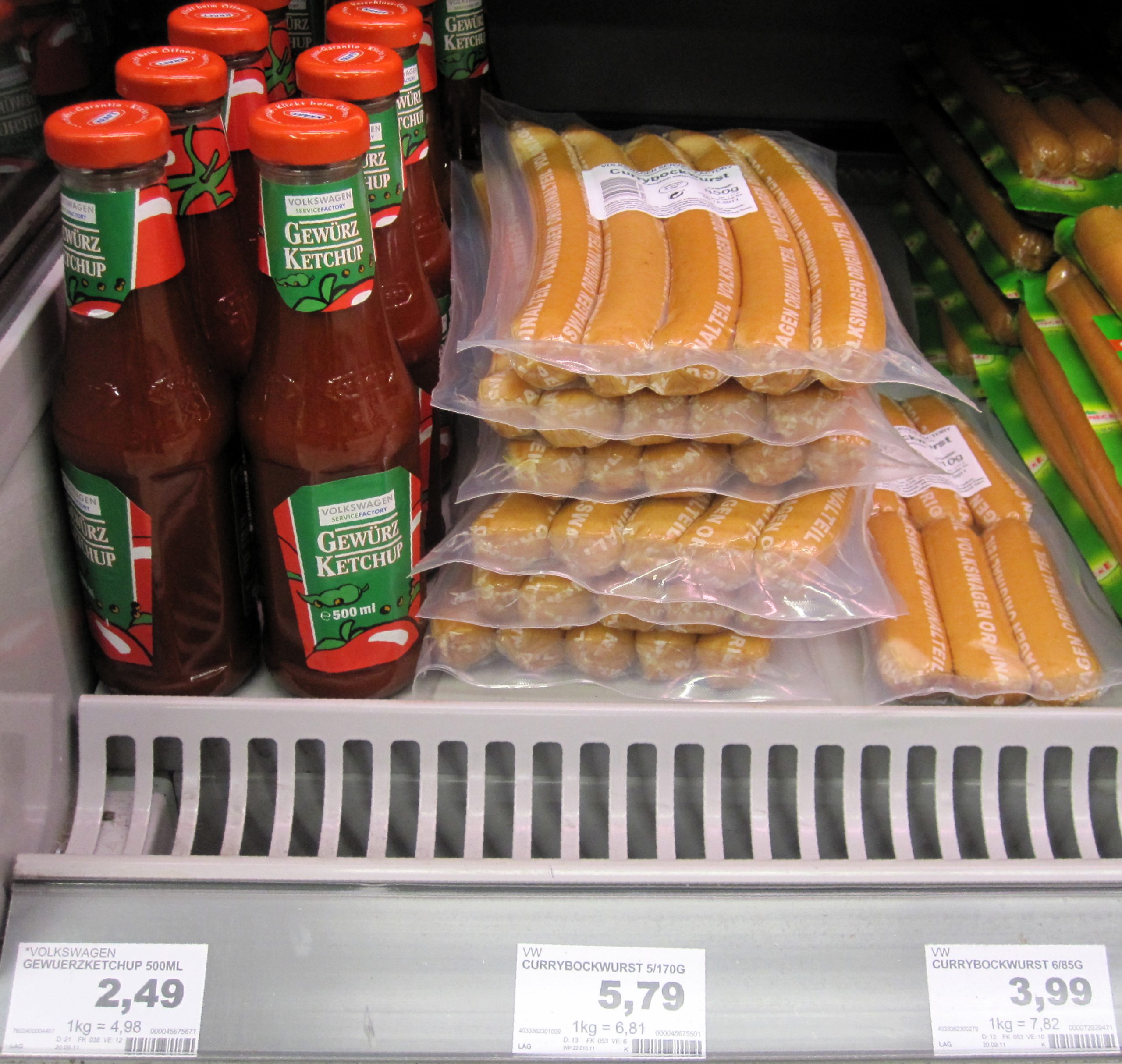
Volkswagen curry ketchup alongside currywurst for sale. Photo by Monstourz.
Sold at local supermarkets and through other distribution channels, 40% of the currywurst VW made was consumed by employees. One would assume that other 60%, sold in over a dozen countries, was earning them a little pocket change. In fact, VeeDub themselves described currywurst as their “most popular product without wheels.”
Note that this has all been written in past tense. Car and Driver set me up for disappointment with that blurb. As of August 20, 2021, Volkswagen announced they were winding down currywurst production, so now it’s not available anywhere: VW decided that pork sausage isn’t good for workers or the environment, so it’s been discontinued and replaced with a vegetarian options like eggplant patties and jackfruit burgers at the urging of then-VW-CEO Herbert Diess. (Apparently the currywurst contained no protein powder, MSG or phosphates, so it sounds like it wasn’t totally awful health-wise.)
Well, phooey.
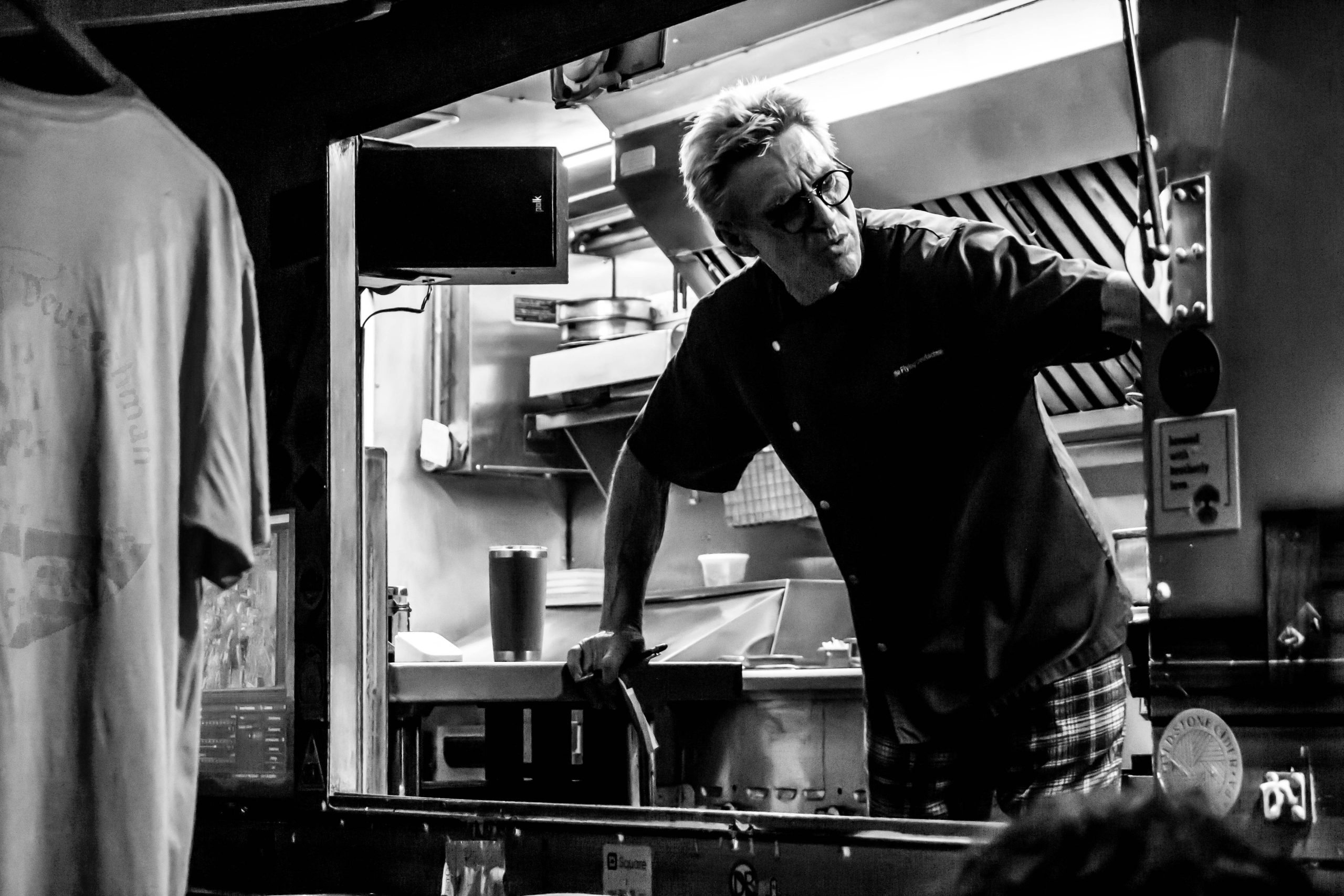
Stirling Sowerby is the Flying Deutchman, my currywurst hookup for the weekend. Photo by Lemmy.
I came this far in my research, so I felt a need to try this food. I moved to Plan B: try some non-Veedub currywurst. My Teutophile buddy recommended a spot and we set a date. This was shaping up to be the tastiest assignment I’ve had yet here at Shop Press, ja? We converged upon a local brewery to meet up with a food truck called The Flying Deutschman. Interestingly, the truck itself, which is named Heidi, was previously an old Snap-On tool truck. The close relationship between sausage and cars just keeps getting deeper, doesn’t it?
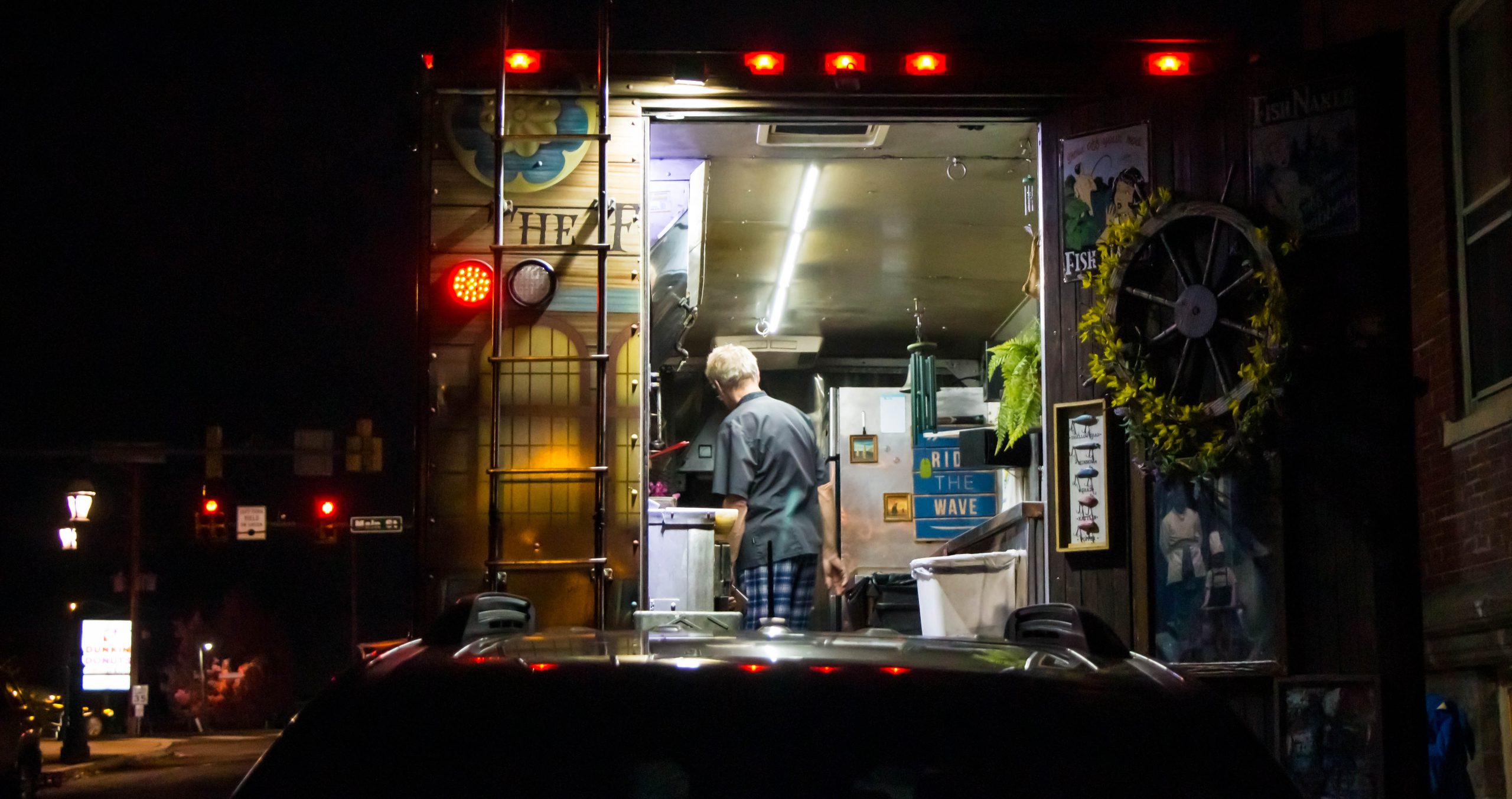
Meet Heidi, the truck who makes The Deutschman able to fly. (Read his Google reviews; half are about his food and the other half are about his driving.) Heidi used to be a Snap-On tool truck. Imagine how much money I could potentially spend on this truck over its lifespan. Photo by Lemmy.
Stirling, the owner, served me currywurst two ways: one in typical German street-fare fashion, and another that was dolled up a little with egg salad as well as sauerkraut with some caraway seeds. His sausage was a bit grainier than a hot dog, but my buddy informs me that street food in Germany usually has a lower-quality sausage that has less “tooth” to it.
He actually had, believe it or not, a special machine devoted just to slicing the sausage. (How German!) In it went at the top, and out it came in lovely bias-cut coins at the bottom.

A most welcome companion for a few beers. Photo by Lemmy.
The curried ketchup was divine. Both flavors are strong, and the sweetness and acid from the ketchup and aromatic curry cut through the richness of the sausage. The flavors are all recognizable (if you eat Indian food, anyway) but they’re not usually tasted together, which makes the dish simultaneously exotic and familiar.
I tucked in and pretended I was famished after a long, hard day of fastening together cars with triple-square hardware. It was, predictably, delicious.
I fully understand why this stuff sold as well as it did. It’s a bummer the part is NLA, but I’m pretty happy I learned this was a thing they did at some point—it’s a neat story.
The articles and other content contained on this site may contain links to third party websites. By clicking them, you consent to Dorman’s Website Use Agreement.
Participation in this forum is subject to Dorman’s Website Terms & Conditions. Please read our Comment Policy before commenting.